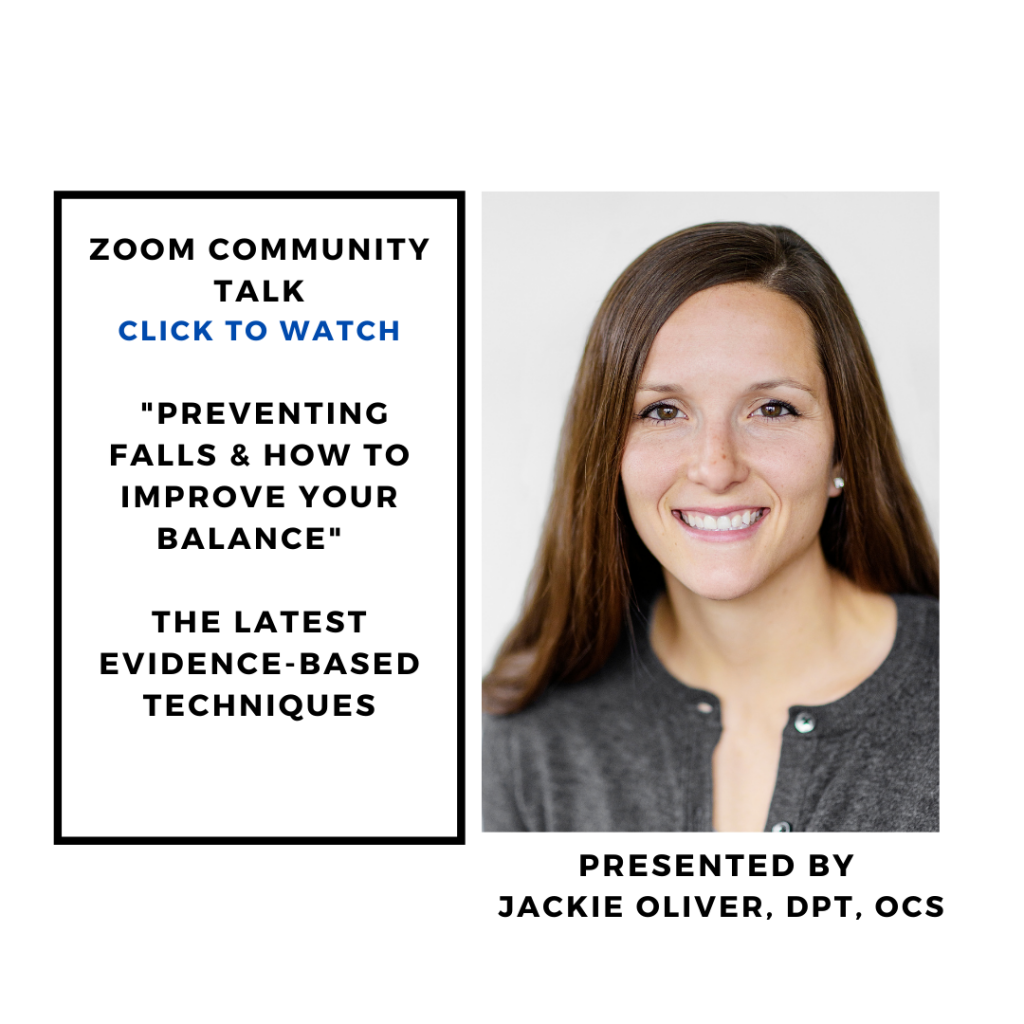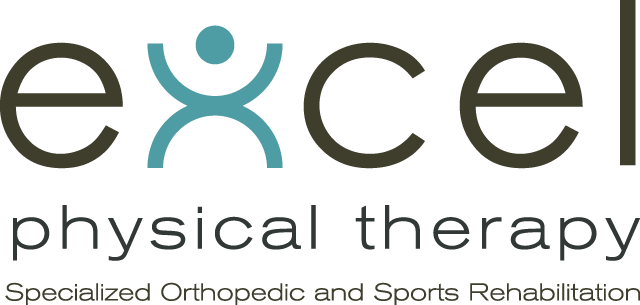
Preventing Falls & Improving Balance Talk
Presented by Jackie Oliver, DPT, OCS, on Zoom
Community Virtual Event – Free & open to the public
Zoom recording link: http://bit.ly/3qCZjwW
- Understand how physical therapy can reduce your risk of falling.
- Learn how to improve your balance with at-home techniques and addressing modifiable risk factors.
- Increase knowledge about what factors contribute to balance issues and how to intervene.
- Recognize the health risks and injuries associated with older adult falls.
- Falls can be prevented!
Q: I fell yesterday walking and I have fallen a lot. All I can think of is, I am not picking up my feet enough? When I hit a crack or something I hit my toe and fall forward.
A: Sometimes that can be a strength thing, maybe your body is not strong enough, not that you can’t do it, but as you fatigue when you’re walking, you’re not lifting your feet as high because you are getting tired. So, your endurance might not be there in the lower extremity. It can be a multitude of factors…it could be your proprioception in the bottom of your feet aren’t picking up the cracks. A physical therapy evaluation can assess exactly what is causing your balance issues. As we get older, we tend to have balance issues that happen a little easier. We definitely don’t want you falling, especially outside on the hard concrete, that’s not a great place to be falling. Definitely worth a mention to your doctor or physical therapist about what you are experiencing so a plan can be put into place to help address this issue for you.
Q: I am someone who is dealing with peripheral neuropathy in my legs and feet, what do I do? Also, I am not able to lift my feet high enough when walking due to peripheral neuropathy.
A: So what you will want to do is uptrain like we talked about in that pie chart. We talked about a third, a third, and a third for vision, vestibular and peripheral neuropathy. The pie chart section that focuses on peripheral neuropathy is closing because you don’t have the sensation in your feet anymore. So you have to uptrain those other systems in order to compensate for the proprioception loss. Yes, it’s absolutely trainable. Not being able to lift your feet high enough is a strength thing, with peripheral neuropathy, you’re not going to change the peripheral neuropathy, you’re going to uptrain those other systems. It’s like a muscle making those other systems stronger, so you aren’t worried about the peripheral neuropathy impact as much.
Q: Is there somewhere we can access the charts that you were talking about?
A: The whole presentation will be loaded onto the Facebook page and the Excel website with the slides. (coming soon)
Q: What would you recommend as a call assist company for around your neck so if you fall you can get assistance?
A: With a little research online or by talking with family or friends, you can find one that will work with you. Recommendation given about Apple watch that asks if you have fallen and sends GPS tracking on where you are at if you don’t answer.
Q: Is there a booklet or something we can get with a detail view of different exercises we can build on for helping with resistance to falling?
A: A physical therapist can help determine a customized exercise program to help you with this. Also, tai chi, like yoga, is a great program to help with significant help on falling, some research showing up to 3 times a week has helped. Talk to your physical therapist, because we can have different deficiencies because you may be deficient in your quads and hamstrings somebody else may be deficient in their glutes. You may struggle with lifting your feet up and somebody else will struggle when they start doing head turns so getting a really specific exercise program is probably the best advice, so you’re not wasting your time so you’re not working on exercises you don’t need to work on.
Q: Does Medicare cover balance training?
A: Yes, Medicare does cover balance training during a physical therapy appointment.
Q: Do you have suggestions on footwear?
A: Making sure you are in a footwear that you are comfortable walking in. Something that isn’t bulky or has a high heel on it or has a big thick sole on it where you can get it caught on cracks in sidewalks. Flip flops, sandals in the Summer time are going to be hard to justify because they can slip on feet and effect balance. Specific footwear would be something to talk to your physical therapist to get headed in the right direction.
Q: Height of chair seat for a sit to stand desk?
A: There is a standard height, generally the measurement is dependent on height of the person using the desk. A physical therapist can help you determine the ideal measurements best suited for your positioning needs.
Q: Balance with a new hearing aid?
A: Vestibular system is a big part of our balance system that contributes to balance and having a new hearing aid can throw of your balance because things are different for you.
![]() Jackie Oliver, DPT, OCS completed her Doctorate in Physical Therapy at the University of Utah in Salt Lake City, Utah, one of the top Physical Therapy schools in the nation. She was fortunate enough to complete her clinical rotations and begin her physical therapy career within the University of Utah system, which is consistently ranked near the top in healthcare. Exposed to a wide variety of orthopedic conditions, Jackie is confident when assessing and treating a broad range of orthopedic impairments. Jackie is a certified dry needling provider with advanced training from Evidence in Motion and KinetaCore. Jackie achieved the Orthopedic Clinical Specialist advanced certification after extensive advanced training coursework and a stringent examination process from the American Physical Therapy Association.
Jackie Oliver, DPT, OCS completed her Doctorate in Physical Therapy at the University of Utah in Salt Lake City, Utah, one of the top Physical Therapy schools in the nation. She was fortunate enough to complete her clinical rotations and begin her physical therapy career within the University of Utah system, which is consistently ranked near the top in healthcare. Exposed to a wide variety of orthopedic conditions, Jackie is confident when assessing and treating a broad range of orthopedic impairments. Jackie is a certified dry needling provider with advanced training from Evidence in Motion and KinetaCore. Jackie achieved the Orthopedic Clinical Specialist advanced certification after extensive advanced training coursework and a stringent examination process from the American Physical Therapy Association.
Jackie has an intense passion for helping and educating others as well as preventative medicine. Because of her college sports background, Jackie loves working with athletes and has experience with biomechanical training and injury prevention in sports. She is also trained as a Diabetes Lifestyle Coach and has worked for the University of Utah and CDC helping individuals decrease their risk of developing diabetes.
Prior to completing her Doctorate in Physical Therapy, Jackie played basketball for Carroll College in Helena, Montana, while also obtaining a Bachelor of Arts degree in Health Science. Jackie was Academic All-American her last two years at Carroll.
